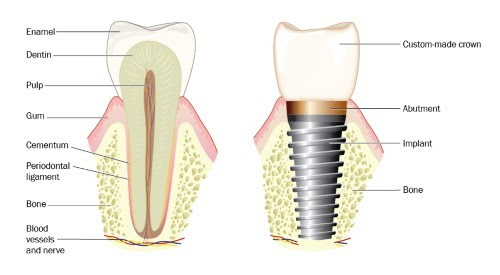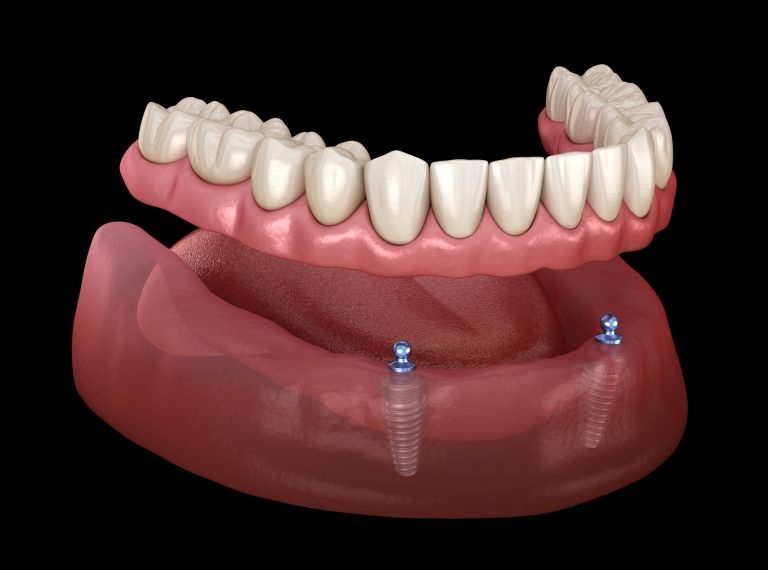Dental Implants
Dental implants feel and look the same as natural teeth. They keep the adjacent teeth stable, the gums healthy and help prevent premature aging and facial sagging, all of which help you to have a cosmetic, healthy smile.

What Are Dental Implants?
Dental implants are one of the biggest and most successful advances in modern dentistry. They are an effective, long-term option if you have missing teeth or wear dentures that are uncomfortable. An implant is a small, titanium root-shaped screw that is inserted into the jawbone to replace a missing tooth or to help retain dentures. The implant fuses with the bone and healing is usually completed within 3-4 months. This provides a solid foundation for an abutment and dental crown. The implant looks, feels and acts like a real tooth, and if properly cared for, can last a lifetime.
Benefits of Dental Implants
There are several advantages to choosing dental implants over other options such as dental bridges or partial dentures. Some of these benefits may include:
- Durability - Because they are made from titanium and are biocompatible, dental implants can last a lifetime, whereas a dental bridge may only last approximately 10 years. Proper care is required for longevity.
- Improved Ability to Eat - Dental implants restore the ability to chew the same way that you did before losing the tooth. Implants are as strong and functional as natural teeth allowing you to chew the foods you want, essentially eliminating one of the main problems with dentures.
- Behave Like Natural Teeth - Most patients are unable to tell much difference between an implant and their natural teeth. Dental implants feel and look the same as natural teeth. They keep the adjacent teeth stable, the gums healthy and help prevent premature aging and facial sagging, all of which help you to have a cosmetic, healthy smile.
- Convenience - Because dental implants look and function the same as natural teeth, they make it easier to floss and brush and eliminate the timely hassles associated with denture removal.
- Improved Oral Health - Dental implants don’t require adjustments or alterations of your adjacent natural teeth like bridges and partials do. This leaves your teeth in a healthier state which helps with long term oral health. Implants also help to retain bone in their natural state.
- Improved Speech - Dentures typically move and slip around the mouth to some degree or another, making it difficult to speak. Dental implants can help retain dentures from movement, thus eliminating this complication.
- Prevent Bone Loss - After a tooth is extracted, the jaw bone deteriorates and shrinks due to lack of stimulation. This shrinkage continues throughout the years, leaving a continual deterioration of the bone. Dentures that do not fit correctly can also cause bone loss as they continually rub on the bony ridge. Implants act as a natural tooth, therefore, allowing the normal stimulation of bone growth as normal chewing takes place.
Are Dental Implants Right For You?
- Heavy smoking
- Uncontrolled diabetes
- Periodontitis or other gum disease
- Inadequate bone
- Severe clenching and grinding
- Some chronic systemic diseases
- Pregnancy
- Undeveloped jaw in adolescence

Implant Retained Dentures
Dental Implants have become the treatment of choice for missing teeth. The loss of all of your teeth brings a variety of complications that can have a severe impact on your physical and emotional health. Traditional dentures have limited success, as they are not stable and secured. Dentures can make it difficult to speak clearly and to effectively chew the foods you desire. Discomfort and soreness, muscular issues and headaches almost always accompany dentures as they slide and shift around as you move your mouth. Implant retained dentures are an innovative restoration that provides denture wearers the quality of life and oral health they so much desire. Special attachments on the implants help secure the denture in place, thus eliminating all of the problems associated with the movement of the denture. Implant retained dentures are life changing.
Bone Grafting
What is bone grafting?
Bone grafting may sound complicated and painful, but it is a minor surgical procedure done in the dental office with local anesthesia. This procedure is done in order to strategically “rebuild” jawbone in areas where it has been lost or to preserve the existing bone after tooth extraction. Your body then grows new bone cells, replacing the graft material over several months.
Why do I need a bone graft?
In order for a dental implant to securely fuse to your jawbone, there needs to be sufficient bone surrounding the implant. Not only is the volume of the bone important, but also the quality and density of the bone. After tooth extraction, the quality and quantity of bone deteriorates quickly, leaving inadequate bone to place an implant. By placing a bone graft at the time of extraction, the amount of bone loss, or shrinkage, is minimized allowing Dr. Duke to place an implant 3-4 months later. If your jaw has already changed because the extraction took place some time ago, placing a bone graft can augment the jawbone and many times provide the sufficient bone necessary for implant placement. If you have adequate bone, then no bone graft is necessary before implant placement.
Where does the bone graft material come from?
There are several different types of bone grafts. Some bone grafts can come from your own body, but the vast majority of dental bone grafting materials comes from laboratory-processed bone. This bone can be from human or animal (usually cow) donors or from synthetic materials. Because these are mineral bone substitutes, and not living tissue, there is very little to no risk associated with these materials. They go through an extensive and rigorous process and come from highly reputable banks that use meticulous screening processes, thus making them extremely safe. Furthermore, these materials are eventually resorbed and replaced by your natural bone and do not remain in your body.
